Hans Ekkehard Plesser: 70 Years of Spiking Network Simulations: Past, Present, and Perspectives
| When |
Feb 21, 2024
from 12:15 PM to 01:00 PM |
|---|---|
| Where | Bernstein Center Freiburg, Hansastr. 9a, Lecture Hall |
| Contact Name | Fiona Siegfried |
| Add event to calendar |
|
Abstract
The 70th anniversary of the first simulation of a spiking neuronal network by Farley and Clark (Proceedings of the 1954 Symposium on Information Theory, Institute of Radio Engineers) provides a good opportunity to take stock of the development of spiking network simulations over the past seven decades, chart present practices in the field and develop perspectives for the future scientific practice in the field.
Current practice shows an interesting division: Modeling of networks of morphologically detailed cells appears to be almost entirely based on the NEURON simulator with ModelDB as the central, neuroscientifically curated and actively used model repository. In contrast, for networks of point neurons, in spite of some integrative efforts (eg Brette et al, 2007), a wide range of simulation tools exist and furthermore, many scientific publications are still based on hand-crafted code in generic programming languages, with models often at best shared via author-maintained Github repositories.
Computational neuroscience of spiking network models is furthermore dominated by studies based on small networks of a few thousand neurons, even though data-driven models of millions of neurons are publically available and simulation technology has been capable to simulate networks of billions of neurons for a decade. With my presentation, I would like to invite to a discussion these observations, their causes, consequences and - if deemed necessary and desirable - steps towards a better computational neuroscience practice.
About the speaker and his research


